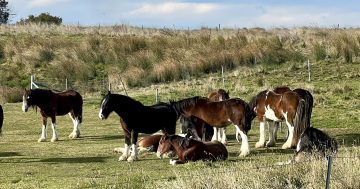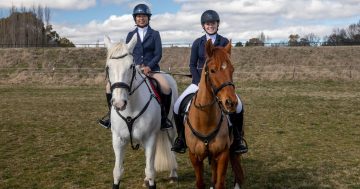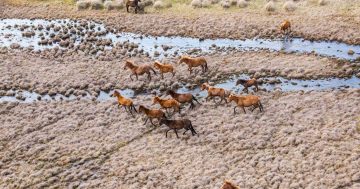
Karen Hood of Heavy Horse Heaven with a couple of her “guests”. Photo: Heavy Horse Heaven.
When Karen Hood led Diesel the black Shire out of the horse float, she stood patiently as the huge horse struggled to get his footing. His back legs didn’t work and he was struggling to walk the few feet into the paddock with the front legs that did. But she slowly led him gently down the ramp and into the paddock. The crippled horse had arrived in his new, safe home.
Diesel had been surrendered to Karen because being in the services, his owner didn’t have the time to spend with him. He was suffering from stringhalt, a neuromuscular condition characterised by involuntary exaggerated movement of the hind legs. It’s not really known what causes it, but it’s possible damage to the nerve muscles may be to blame.
Diesel was brought to the right place: Heavy Horse Heaven (HHH) at Lade Vale near Yass. Since 2011, Karen has been welcoming and caring for these large animals, from Clydesales to Shires – and sometimes others in between – calling them her “guests”.
She cares for heavy horses who have been neglected, abused, or damaged, horses that need just about everything, but especially sanctuary.
She receives no financial support for this work, helped only by a band of volunteers as passionate as she is about the animals. HHH survives on donations and fundraisers for the thousands of dollars needed constantly to pay for feed, equipment, medication, vet bills and maintenance of the 40-hectare property in the Yass Valley.
For the rehabilitated horses she feels can start a new life with humans, she puts them, the humans, through a rigorous vetting program to ensure they are the right fit. She knows the horse will be, it’s the human who will be put through the ringer. If it’s a match, the human can lease the horse for the length of its life, but it always remains the property of HHH and stays in contact to ensure the animal’s welfare is, at all times, paramount.
Karen’s passion for the large horses began when she was a young woman – and dreamed of owning a Clydesdale horse. When she was “finally adult enough to save up to buy one” she realised horses shouldn’t be alone, they need companions. She looked around to see if there was a rescue group for heavy horses but couldn’t find one.
“I spoke to a girlfriend and told her I couldn’t find a rescue group and she said to me, ‘Why don’t you start one?'”
More than 150 horses later, it’s been an amazing ride for Karen. For the past 11 years she has run the Lade Vale sanctuary, providing a haven for heavy horses and sometimes smaller horses if they are bonded paddock companions. The horses need the care through no fault of their own. They may have been mistreated or neglected or just bought by people who were simply not educated on their needs.
Following 18 months of solid rehab, vet care, special feed and supplements as well as lots of physio and chiropractic treatment, Diesel is a new horse – and the HHH mascot.
“He’s just a big sweetheart,” Karen said of the huge gelding. “He’s still a bit steppy, but he’s getting continuing chiropractic work which is helping so much. We even got a purpose-built float for him so he can walk in backwards so we can get him on and off.”
Watching the before and after video of Diesel shows what can be done with expert care, the right food – and the development of trust between animal and human. “I can talk about the work that was put into Diesel but you just have to look at the video … it explains it way better than I can with words,” Karen said.
Karen is keen to dispel misconceptions about heavy horses that they’re all just gentle giants, that they don’t need a lot of care or understanding.
“They are so much more than that,” she said. “They are sensitive animals, they need care but they also need to be educated.”
One of the hardest parts of what she does, apart from the fact that she runs Heavy Horse Heaven as a not-for-profit on a shoestring, is when she has to go out to rescue a horse. “From the get-go,” she said, “I tell the volunteers that we have to draw a line. That once we get the horse out of there and bring them home here, everything that horse gets from then on will be positive. If you don’t do that, doing this would crush you.”
So what does she do after a bad day? “I’ll go and fill the bath up, get a gin and tonic, and cry my eyes out,” she said. “Then I’m OK. It’s just a matter of keeping a positive outlook and not looking back.”
Karen has a job in Canberra but would love to spend more of her time at HHH. She has set up an on-farm business, Maykazz, in which she uses her embroidery and printing skills on everything from show ribbons to horse rugs to clothes and toys. She hopes one day this business will allow her to work on the farm permanently and support HHH.
For more information about how you can help Karen continue this lifesaving work, go to the HHH website.










